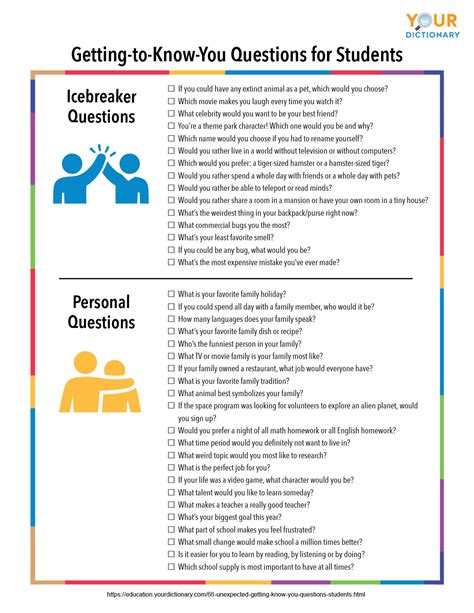As educators, it’s crucial to establish meaningful connections with our students to foster a positive and effective learning environment. Asking thoughtful questions is an essential tool for getting to know their unique perspectives, learning styles, and motivations. This article presents an extensive list of questions designed to provide insights into your students’ personalities, interests, and aspirations.

- What’s your name and what would you like to be called?
- What pronoun should I use to address you?
- Where are you from and how has your upbringing shaped your worldview?
- What are your favorite subjects and what do you find particularly interesting about them?
- What are your hobbies and passions outside of school?
- How do you prefer to learn new information?
- What are your strengths and areas for growth as a learner?
- What motivates you to succeed academically?
- Are there specific learning environments or strategies that you find particularly effective or challenging?
- How do you manage your time and stay organized with your studies?
- What are your career aspirations and what steps are you taking to achieve them?
- What are your long-term goals and dreams beyond school?
- What are your values and how do they influence your educational and career choices?
- What are your fears and challenges related to your future?
- What role do you envision yourself playing in your community and the world?
- How do you identify culturally and what are some important aspects of your identity?
- What are your thoughts on diversity and inclusion, and how can we create a more inclusive classroom?
- How do your cultural background and experiences shape your perspectives on education and life?
- What are your experiences with cultural differences and how have they influenced you?
- How can we better support students from diverse backgrounds in our classroom?
- Who are your role models and mentors, and what qualities do you admire about them?
- What kind of support do you need from me and other members of the class to be successful?
- How do you prefer to receive feedback and how can I provide it in a way that is most helpful to you?
- What are your concerns or worries about this class or your educational journey?
- How can we create a classroom environment that fosters respect, collaboration, and a sense of belonging?
- How are you prioritizing your physical and mental health?
- What self-care strategies do you find most effective?
- Are there any health or wellness concerns that I should be aware of that may affect your learning?
- How can we promote a healthy and supportive environment in our classroom?
- What resources are available on campus or in the community to support students’ health and well-being?
- How do you typically approach assessments and what strategies help you succeed?
- What kind of feedback do you find most helpful, and how can I provide it effectively?
- How can we establish a clear and transparent assessment system that promotes student learning?
- How can we engage students in self-assessment and peer feedback to foster growth?
- What opportunities are there for students to provide input and feedback on their learning experiences?
Science
- What scientific discoveries fascinate you the most and why?
- How do you approach scientific inquiry and experimentation?
- What are your favorite science topics and why?
- How do you envision using your knowledge of science in the future?
- What scientific challenges or problems are you particularly interested in solving?
Math
- What is your favorite math concept and why?
- How do you approach math problems and what strategies do you find effective?
- What are your math goals for this class and beyond?
- How do you apply math to real-world situations?
- What careers or fields involve math that you find particularly interesting?
History
- What historical period or event are you most passionate about and why?
- How do you approach the study of history and what sources do you find most valuable?
- What are your thoughts on the significance of history and its relevance to today’s world?
- How can we make history more engaging and accessible to students?
- What historical figures or events inspire you and why?
Language Arts
- What is your favorite book, author, or literary genre?
- How do you approach reading and writing, and what strategies help you succeed?
- What are your strengths and areas for growth as a reader and writer?
- How do you use language and literature to express yourself and connect with others?
- What are your aspirations in the field of language arts, such as writing, publishing, or teaching?
- Start by asking open-ended questions that encourage students to share their thoughts and experiences.
- Be patient and listen attentively to their responses.
- Use follow-up questions to clarify and deepen their responses.
- Create a safe and respectful environment where students feel comfortable sharing their true selves.
- Be mindful of cultural differences and avoid making assumptions based on students’ backgrounds or identities.
- Use the information gathered from these questions to tailor your instruction and support to meet the individual needs of your students.
Asking thoughtful questions is a powerful tool for educators to establish meaningful connections with their students. By delving into their personalities, interests, aspirations, and challenges, teachers can gain valuable insights that enable them to create a supportive learning environment that fosters student growth and success. The questions provided in this guide offer a comprehensive framework for getting to know your students on a deeper level and empowering them to reach their full potential.
